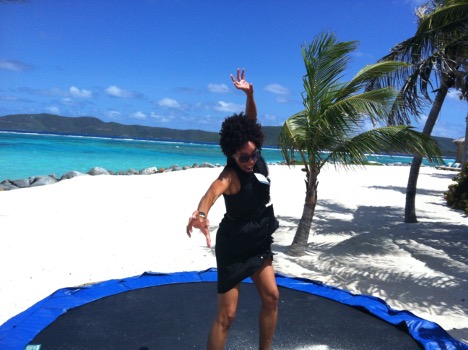Caribbean Nations Must Think Bigger and Act Boldly and Soon to Sustain Ocean Resources
Originally published on the (now archived) National Geographic blog.
May 23, 2013
Necker Island, British Virgin Islands. Privately owned by Richard Branson, and Summit site.
I was honored to be asked to speak at the Caribbean Challenge Initiative's Summit of Political and Business Leaders, which took place in the British Virgin Islands May 17th and 18th.
I spoke from the heart, and here is what I said:
At the risk of being controversial, I would like to offer my honest take. The #1 threat to coral reefs is lack of political will and sense of corporate responsibility. It’s great that this summit is focused on those two groups, but we need much more progress on this front. Apart from that, the primary threat has long been overfishing, and that is now being joined by, and soon to be eclipsed by, climate change. Pollution and habitat destruction are at #3 and #4, the order depending on your location.
I was invited to speak about overfishing. Overfishing is a serious, serious problem. But there are simple solutions: DON’T CATCH AS MANY AS YOU CAN, EVERYWHERE YOU CAN, ALL OF THE TIME, WITH WHATEVER MEANS YOU WANT.
That means limiting the amount of fish that you take out of the ocean (i.e., total allowable catch). That means closed areas (i.e. fish sanctuaries, reserves where no fishing occurs). That means closed seasons (i.e., times of the year when you do not fish for certain species). And that means restricting and banning some types of fishing gear (i.e., gear that damages habitat, targets juveniles, has high bycatch) – proliferating use of nets is the primary problem here.
All these measures amount to: give the fish and the reefs a break. Give them a respite, a chance to reproduce and replenish. Then fishing can be sustained at a higher level and be more profitable, and there will be more for tourists to see.
If there is one thing you should focus on to improve the health of coral reefs and the fisheries that depend on them it is protecting key herbivores: parrotfish and surgeonfish. They are the lawnmowers of the reef that eat the algae so slow-growing coral stands a chance. They are not choice fish in the Caribbean – there is not a strong cultural/traditional attachment to consuming these species.
Belize enacted a ban on catching parrotfish and surgeonfish two years ago, and it is well supported by the community. Parrotfish and surgeonfish are only being heavily targeted now because they are the most abundant fish left after severe depletion of groupers and snappers. However, political and business leaders at this Summit committed to focus on creating regional protection for sharks and rays. I think that misses the point; that’s low hanging fruit, and it is not what is needed to restore coral reef ecosystems.

In mulling over all the speeches I heard yesterday, the almost entirely vague commitments made by political and business leaders, at first I thought that what we needed was to be more ambitious, to set bigger goals. But really it’s that we need to be more practical. In a region that is so heavily dependent on tourism related to healthy ocean resources, it is simply bad business to allow those resources to continue to degrade.
100% of the ocean should be managed. Managed just means to have a plan. And the goal of that plan should be to increase the quantity of fish closer to their former abundances, and to fish in a way that is sustainable. So I would implore you to be MUCH more visionary than the Caribbean Challenge goal of 20% managed by 2020. If I had gotten to write the goals for the Caribbean Challenge I would have written: 100% of ocean area managed by 2020, and 20% of ocean areas set aside in fish sanctuaries that are completely closed to fishing.
You may say this sounds extreme, but all this really means is treating the ocean more like the land. You don’t just let people bulldoze willy nilly on land, you require permits for development; there are limited areas for industrial use; there are parks; there are farming areas. You should do the same for the ocean.
There is room for creativity in solutions. One such solution for sustainable fishing is the research that won me the Rare/National Geographic Solution Search prize. If you put a slot, a vertical and rectangular escape gap, in the corner of a fish trap you can reduce bycatch by 80% without at all reducing the value of fishermen’s catches. There are other such solutions ready for implementation.
There is also room for needed national and local specificity, but really we all need to think bigger. Not just protected areas, but comprehensive, island-wide zoning of entire coastal oceans or even entire exclusive economic zones, based on science, and with deep stakeholder engagement. That is the approach the Waitt Foundation is taking with initiatives in Bermuda and Barbuda, and we hope to do more of that holistic work in the near future. So if any islands represented here are interested in taking that approach, let’s talk.
P.S. The list of commitments made at the Summit is now available. Look for yourself and see if you think these measures show adequate vision, financial commitment, and concreteness. Overall, I remain disappointed. (With the exception of Bamboo Sushi who is doing a lot for a small company.)


